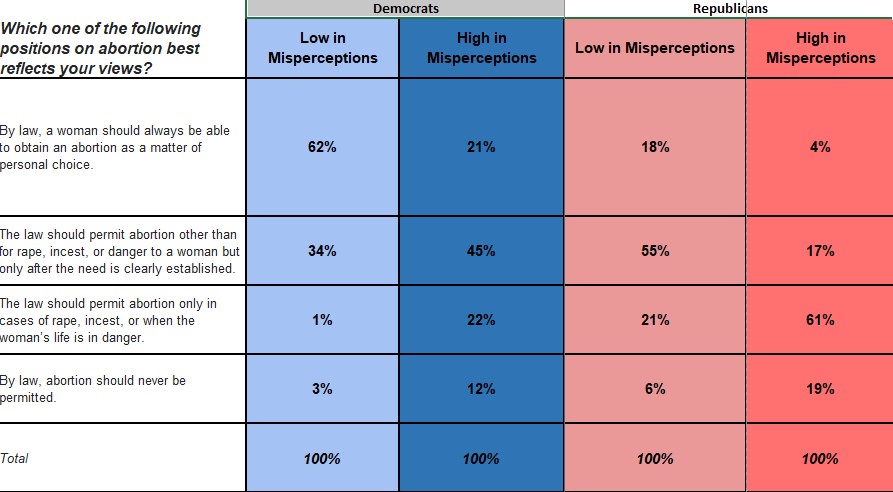New Research from UD’s Center for Political Communication Shows Voters Lack Key Information About Abortion
Media Contact:
Peter Bothum
Director of Media Relations
Office of Communications and Marketing
[email protected]
NEWARK, D.E. – September 16, 2024
New Research from UD’s Center for Political Communication Shows Voters Lack Key Information About Abortion
Many voters hold misperceptions about abortion, a new study from the Center for Political Communication (CPC) at the University of Delaware shows. This finding has implications for the coming election, given that a majority of registered voters say the issue of abortion will be “very important” for determining how they vote. And in 10 states, voters will weigh in directly on ballot measures to set abortion policy. The information voters have about abortion may shape their behavior on election day.
How Common are Abortion Misperceptions?
In a nationally-representative sample of adult Americans surveyed by YouGov in November of 2023, CPC researchers asked about key facts related to the timing and risks of abortion procedures. The results revealed that many voters hold inaccurate beliefs about abortion. For example:
- 60% of Americans believe most women regret having an abortion, though about 95% report their abortion was the right decision 3 years later.
- 30% think that having an abortion increases a woman’s risk of developing breast cancer, a connection that has been debunked by the medical community.
- 18% believe the majority of the public does not support abortion rights (polls consistently show a majority of Americans supported Roe and reproductive rights more generally).
- 26% believe that having multiple abortions is uncommon (though 40 percent of women seeking an abortion report it’s not their first one).
- About 12% think abortion is common after the first trimester, however 91% of abortions take place in the first trimester.
Republicans Hold More Misperceptions Than Democrats
Large numbers of Democrats and Republicans hold these misperceptions — though they are significantly more common among Republicans. This was true for four of the five misperceptions studied:
- 79% of Republicans incorrectly believe most women regret having an abortion, compared to 45% of Democrats.
- 37% of Republicans incorrectly think that having an abortion increases a woman’s risk of developing breast cancer, compared to 21% of Democrats.
- 42% of Republicans incorrectly believe the majority of the public does not support abortion rights, compared to 15% of Democrats.
- 16% of Republicans incorrectly think abortion is common after the first trimester, compared to 7% of Democrats.
The one misperception more common among Democrats concerned belief in the prevalence of repeat abortions:
- 33% of Democrats incorrectly believe that having multiple abortions is uncommon, compared to 18% of Republicans.
Why Do People Believe Things About Abortion That Aren’t True?
“There are a variety of factors at play,” explains Dr. Erin Cassese, Associate Director of the CPC. “Voters are encountering these ideas directly from politicians in their campaign communications. For instance, in last week’s debate, former President Trump said that Democrats support “abortion in the ninth month” and even “execution after birth.” The former President’s remarks were fact checked by debate moderator Linsey Davis, who reminded the audience that killing a baby birth is infanticide which is illegal throughout the United States.
Cassese highlighted the chaotic legal and informational context related to reproductive health following the Supreme Court’s 2022 decision in Dobbs v. Jackson Women’s Health Organization, which overturned Roe v. Wade. “The legal and informational environments surrounding abortion have become more complex now that abortion policy making has returned to the states,” she explains “And there’s also a relatively low baseline of public knowledge about women’s reproductive health more generally.”
How Will Abortion Misperceptions Affect the Election?
The study finds that incorrect beliefs about abortion are related to voters’ support for abortion policy, which has been the focus of campaign messaging not only in the Presidential race, but at lower levels of office as well.Democrats and Republicans’ support for abortion varies depending on whether they hold accurate or inaccurate perceptions about abortion. To show how these groups differ, the research team compared people who scored in the lowest 25th percentile across all abortion misperceptions to those in the 75th percentile or above.Among Democrats with the least abortion misperceptions, 62 percent believe that “By law, a woman should always be able to obtain an abortion as a matter of personal choice” compared to only 21 percent of Democrats who hold the most misperceptions. For Republicans, among those who held the least abortion misperceptions, only 6 percent believed that “By law, abortion should never be permitted”, compared to 19 percent of Republicans highest in misperceptions.

“Our findings suggest that the public needs a greater supply of accurate information about this crucial area of public policy and public health,” explains CPC Director, Dannagal Young. “The prevalence of misperceptions suggest voters are struggling to navigate a complex information environment leading up to election day.”
About the Study
The survey was conducted by YouGov in November 2023 as part of the Cooperative Election Study. A representative sample of 1,000 adult Americans were surveyed online. Statistical results are weighted by demographic factors to best reflect the electorate as a whole. For further details about the sample and methodology, please contact Erin C. Cassese, PhD
([email protected]).
About the University of Delaware’s Center for Political Communication
The University of Delaware’s Center for Political Communication, established in 2010, is a nonpartisan, interdisciplinary center connecting academics, students, and the community to relevant issues in political communication.
